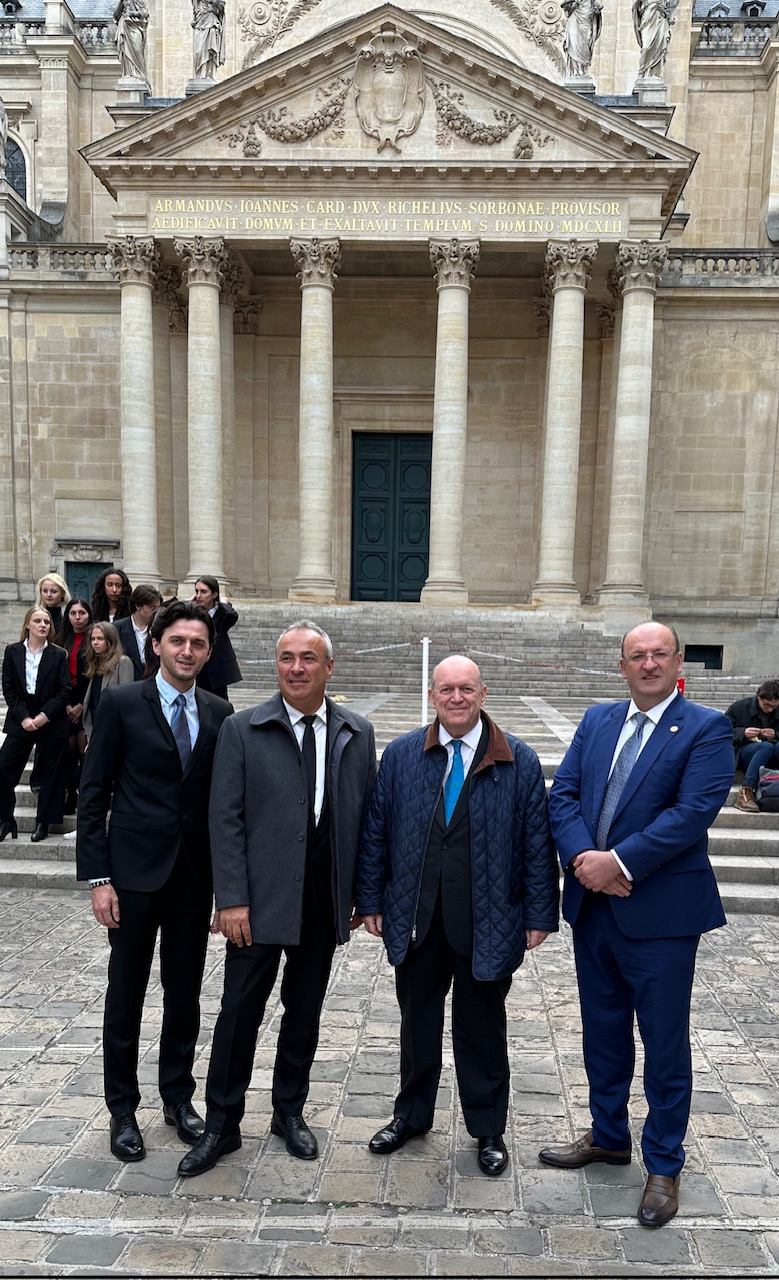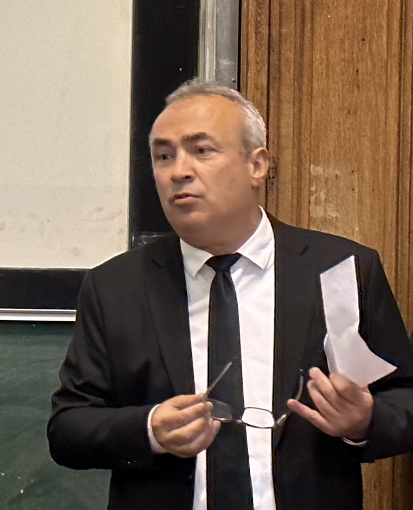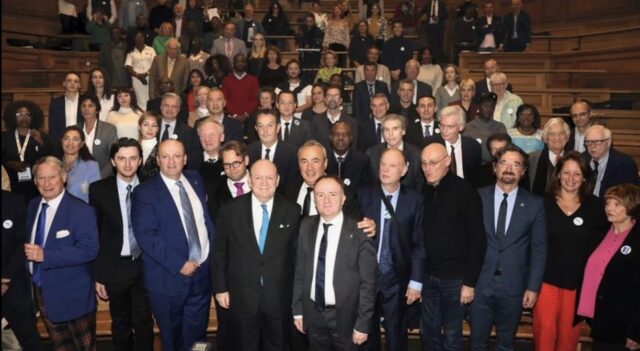Lecture by CHRISTOPHER S. HYLAND (of Hyland Center for Global Studies – UBT) at CONFERENCE FOR PEACE DEMOCRACY VERSUS AUTOCRACY – Tuesday 17 October – UNIVERSITY PARIS 1, PANTHÉON SORBONNE
Sponsored by TOUT POUR LA RÉPUBLIQUE Joseph Michael Viere, president – ADBN – Hazis Vadar, président – Naim Dervishi, Executive Director
Kosova’s Prime Minister, Albin Kurti, also spoke at the Conference

Ladies, gentlemen, your Excellencies, senators, legislators, professors, students, guests of honor, good evening.
Thanks to Joseph Michael Viere, of Tout Pour La République for his leadership, to UBT – Hyland Center for Global Studies and to its rector Edmond Hajrizi, to Naim Dedushaj, and, always, thanks to Jim Xhema with whom, together, we helped build a remarquable jurisdiction of liberty. Especially, thanks to Hazis Vardar, President of ADBN. His tenacity and commitment to justice, equity and peace brought this conference to life.
It is a pleasure to share the podium in Richelieu-Oury with Mr. Olivier Vedrine, among the big names around us. Thank you for giving me the opportunity to share my thoughts and suggestions concerning:
—Kosovo and the Constitution of Kosovo;
—the creation of a Commonwealth of Balkan countries, as well as the admission of the Western Balkans to the European Union;
—how it must shape history for the better, supporting, at the same time, moral authority and encouraging peace.
I have the pleasure of being in France, a country which, in a splendid gesture of support for suffering Kosovo, was one of the first countries to recognize and protect its independence. Remember how France defended independent Kosovo, as Victor Hugo defended the Balkans during Ottoman aggression. The Hugolian spirit lives.
The European Union demonstrates the unity achieved by communities so diverse. The EU is also financially generous and works to build a civic society in the Balkans. However, these efforts risk being undone, concerning Kosovo and the Western Balkans.
An old adage still resonates: hypocrisy is the compliment that Vice pays to Virtue. The Constitution of Kosovo is Virtue personified.
An autocratic alliance demands that Kosovo implement, within its sovereign borders, a deficient administrative context designed along religious criteria and ethnic lines, namely an association of Serbian-only municipalities. It is notable that the same ethnic and administrative context is not supported by the European Union for the Albanian communities located just across the Serbian border. Establishing an association of Serbian municipalities in Kosovo will make the Constitution of Kosovo useless and ineffective. But, admission to the European Union has never depended on the creation of associations of separate ethnic towns.
What I call the Global Free, the free world, defends freedom in Ukraine. But, through a selective autocratic gesture, it is trying to destroy the Constitution of the Republic of Kosovo, the most liberal and inclusive ever written, and is excluding the Western Balkans from the European Union. The situation reminds us of the old adage “that what is solid is, in reality, fleeting, that everything, even good, is susceptible to perpetual harm.”
Rather than following the recent German declaration to “…defend the United Nations Charter and the Rule of Law”, a remarkable confluence of strange partners, led in different ways, by France, Germany, the United States of America, the European Community, Serbia, Russia, and communist China wants to undermine, make permanently dysfunctional the Constitution of Kosovo, which is, without doubt, the most inclusive constitution ever written. This failure to defend one’s rights, and those of others, is what Thomas Mann calls “self-forgetfulness.”
However, the Constitution of the Republic of Kosovo is a document of immense dignity: a document affirming freedom and equality for all, something found in very few constitutions. It is the antithesis of autocracy. It is a document of great beauty. It is the culmination of centuries of enlightenment. Child of the French Enlightenment, it is one of the greatest achievements of humanity.
This is why, today, together, we ask ourselves whether the Assemblée nationale, the Senate, or the Sorbonne community know the extent to which the French government, and others, aggressively advocate governance by designated religious zones in Kosovo. We all have to ask ourselves: does the Macron government want the same ethnic divides for France?

The states devoted to the slavery of African captives did not last in my United States. Separate ethnic regions did not work in Reich Germany either. Six hundred and twenty thousand died in the United States to correct this horror, and 20 million in Europe. Millions more have died over the centuries to ensure that – in good measure – constitutional government triumphs. Imposing such divisions is not a good example for Europe. It will overthrow the Constitution of Kosovo, and ensure permanent instability in Kosovo, in the region, and in Europe.
Kosovo must now remain firm while awaiting the reaffirmation of constitutional ideas by an errant Global Free, although always ready for dialogue.
The dynamic and reforming Prime Minister of Kosovo, Albin Kurti – and Kosovo – are described by some as stubborn because they are loyal to their very inclusive Constitution. They face so many challenges. Serbia, for example, sets up polling stations in Kosovo, and urges citizens not to vote. A destabilizing policy that it persistently employs with all its neighbors. Despite everything, Kosovo is still working to improve conditions for all communities, just like America and France who continue to achieve equality for all their citizens. Kosovo, and its Prime Minister Kurti are brave like Martin Luther King, who told me to “look evil in the eye, and give it no help.” We must all be so brave: brave like Kurti, brave like Kosovo.
In the words of Prime Minister Kurti: “our Constitution does not allow an association based on ethnic criteria… Kosovo should have a multi-ethnic society… all community rights are guaranteed by the Constitution.” Few, if any, constitutions in the world grant such broad rights to citizens. Article 24 of the Constitution of Kosovo reads: “No one may be discriminated against because of their race, color, sex, language, religion, political or other opinions, social origin, connection to a community, property, economic condition and social, sexual orientation, birth, disability, or other personal reasons.” Article 38 reads: “Freedom of belief, conscience and religion is guaranteed.” Article 57 sets out rights and privileges for minority communities, in addition to those stipulated in Chapter 11.
Of the 120 members of the Kosovo Assembly, 44 are women, or 36%. France, 34%, the United States, 28%. The global and European average is 30 percent. Kosovo has a female president, Vjosa Osmani. The United States still does not. Among the other members, in accordance with the law: 10 are Serbs, 4 Roma, 3 Bosnicks, 2 Turks, 1 Gorans. Very impressive. The Constitution of Kosovo cannot be amended without the consent of the minority community. The latter often holds the key to the adoption of laws.
Kosovo, tenacious and courageous, must serve as a beacon to protect constitutionality in the face of autocracy, whether of the Chinese variety, in Hong Kong, or emanating from the European Union. Kosovo, after its independence, had imperfect leaders, just like American and French leaders after their revolutions, and some thereafter.
In addition to its wonderful Constitution, Kosovo has:
––citizens committed to the European cause;
—a strong civic culture;
––many new companies of global standard;
––important new universities such as UBT;
––well-balanced elections;
––a strengthened rule of law;
––efforts against corruption;
—a cathedral financed, in large part, by citizens of Muslim origin;
––historical and religious sites increasingly protected, by Kosovar law;
––had four Albanian popes, and Mother Teresa lived in Kosovo;
––recognized gay rights;
—an embassy in Jerusalem;
––a major US military installation;
––a future full of aspirations…
I proposed special status, beyond existing preservation laws, for the monasteries of Deçanit, Decani, and Pec. The talented Mayor Përparim Rama, and Jim Xhema accepted my suggestion that a monument commemorating the victims of persecution, from all communities, be inaugurated in Pristina.
Despite everything, odious intentions, driven, in part, to control a treasure of minerals must not prevail. These are formed against little democratic Kosovo, in a naked, cruel and shameless display of power. The Global Free does not demand associations of ethnic cities as a solution in Ukraine or for communities persecuted by Chinese communists. But they do it in Kosovo. Imagine the cities of Paris, Frankfurt and New York divided into ethnic enclaves demarcated by their own government: an association of independent Turkish cities in Westphalia, or an association of Algerian communes around Paris. France must be an example of freedom for all and not, as they want in Kosovo, of ethnic division for all. Is this the future of France? Does Kosovo serve as France’s testing ground? Clearly, unacceptable. A medieval point of view, unworthy of 21st century Europe.
President Macron even threatens to revoke visa liberalization for Kosovo, if cities are not created by ethnic division. Germany supports the same parody, and President Biden declares that there is a duel between autocracy and democracy, when, at the same time, he seeks to destroy the democratic Constitution of Kosovo. The European Union, meanwhile, often serves as an echo chamber.
Not once during my tenure as deputy national political director of President Clinton’s campaign have community leaders demanded ethnic groups in the United States have separate cities. Why? I answer: The American Constitution. Notably, the Kosovo Constitution includes freedoms that were not included by the founders of America, nor by the French Enlightenment, intellectual foundations, of the constitutions of the United States and Kosovo, all on the path of French concepts of Liberty, Equality, and Fraternity for all: E PLURIBUS UNUM, of many, one. And as they say in America: indivisible, under the law. In this, in the march of History, France, the United States, and Kosovo, are exceptional. History will not judge favorably the leaders of the European Union and the Global Free, as long as they violate the Constitution of Kosovo which represents the triumph of Ideas and Law over tribal wars and autocracy.

There is no permanent forum for the Balkan countries, without the intervention of third parties, to meet even in a ‘grumpy’ way, as a family, and pragmatically discuss issues of mutual importance. Kosovo, together with other Balkan countries, should therefore create the Commonwealth of Balkan Countries without entry preconditions. A treasure of Commonwealth ideas will, progressively, provide a common cause and common goals. We are already talking about a first meeting.
When the Balkan countries enter the European Union, the Commonwealth will only serve as a meeting point between neighbors. It does not prevent, nor replace entry into the European Union. The Balkan Commonwealth represents hope. Furthermore, nothing will better guarantee the stability of the Balkans and Europe than an immediate accession to the European Union for all the Western Balkans. Rapid progress will be ensured because:
––all boundaries as they exist now will be free and consecrated,
––passage and trade will be free.
Informing cities by ethnic and religious demarcations is not in the spirit of the European Union. The policy against immediate admission causes permanent instability. This seriously threatens peace and the moral authority of Europe.
The European Union insists the Balkans accept ever changing admission criteria, criteria often missed by other members. Financial scandals, drugs, weak governments, and war were not invented in the Balkans, but they are present throughout Europe. The wars in the Balkans pale in comparison to the great European wars of the 20th century.
To insist on blocking the admission of Balkan countries because Serbia must recognize Kosovo makes no sense. Additionally, there are indications that Serbian citizens do not want to be members of the European Union.
The leaders of the European Union continue their dangerous game. Their drawn-out, and damaging negotiations fuel more regional acrimony. It is unfair and condescending not to give the Western Balkans the same chance to free themselves from an unhappy history as Germany and France did after the war. Immediate admission with progressive adoption of European law is the entry method for several countries, some of which still have status anomalies.

Historian Martin Rady writes: “Once in the European Union, some states abandoned their commitments, and their democracies […] often remain tainted by political corruption, government control of the media and dangerous slogans.”
Inconsistently applied concerns call into question the sincerity of the European Union. Europe was, during my lifetime, in the same situation as Kosovo and the Western Balkan countries are today. But there is a difference. The founding leaders of the European Union post-war period were more visionary and more forgiving. Otherwise, Europe would have suffered the same unhappy fate that it imposes today on the Western Balkans.
After years of dictatorship and Nazi oppression, on September 19, 1947, at the University of Zurich, Churchill, the arch nationalist and imperialist, in a great change of mind, declared, to his credit: “There can be no rebirth of Europe without a spiritually great France and a spiritually great Germany. […] Small states will count as much as large ones and will earn their honor by contributing to the common cause.”
In the following years, Europe found its community and peace in clinging to moral authority, putting aside past grudges, through compromise and improvisation, also through a strong Atlantic relationship, and NATO.
The agreements between the countries of the European Union cancel any possibility of war between them, a realization of great human capital. Despite this, there is a threat to European stability in some of the former Soviet Iron Curtain countries. It provides fertile ground for autocratic influence. If Europe does not apply the same vision and inclusive generosity that Churchill, Schumann, Adenauer and others applied to the founding of Europe, it risks falling into the trap of autocracy itself.
Acting to appease reactionaries in the short term is insulting, humiliating, neocolonialist. Rather, the European Union, the Atlantic Community, and Global Free should, once again, embrace inclusive democratic ideals, rather than governing by ethnic division. It’s necessary to:
––support the Constitution of Kosovo,
––encourage the Commonwealth of Balkan countries,
––and immediately admit all Western Balkan countries into the European Union.
The fabric of Europe’s golden field must be woven with diverse threads, to be stronger than ever. Jacques Chirac, a former eurosceptic who became a European visionary, led the enlargement of 10 Eastern European countries in 2004. It is a shame that the spirit of Jacques Chirac does not persist throughout Europe today.
Europe is no longer that of empires. The ethos of the “Volk” must not be capable of ruining everything in its path. Autocracy must not triumph over Western liberalism – without forgetting the ancient democratic traditions found around the world – embodied in the Constitution of Kosovo which is a splendid and more complete achievement of what began, namely the Magna Carta and, among others, the American, German, and French Constitutions.
The Angelus Novus, angel of history, by the writer Walter Benjamin –painted by Klee–, sees history in ruins before him. Let this not be the unhappy fate of the Balkans. For the European Union, strengthening European tribalism is a dead end. Government by ideas is better than government by tribe. Denying the Constitution of Kosovo, not encouraging a Commonwealth of Balkan countries, and refusing the immediate entry of Western Balkan countries into the European Union is aberrant. We must all, as Martin Luther King encourages us, “look evil in the eye and give it no succor.”
European leaders including European President Ursula von der Leyen, President George Vella and Prime Minister Ian Borg of Malta, President Roberta Mazola, and European High Commissioner for Equality Helena Dalli, make democracy a priority.
President Mazola says: “the Western Balkans must find their place in the European Union. Today is the day when enlargement must be used in war.” She supported the liberalization of visas for Kosovo, while President Macron speaks of withdrawal.
High Commissioner Dalli says: “Where diversity is prioritized, it is also a source of wealth and innovation.” President George Vella and Foreign Minister Ian Borg of Malta support the immediate integration of the Western Balkans into the European Union. Malta was the first country to recognize Kosovo. Many European leaders share these sentiments. These good intentions must be realized.
History calls us: it is time to act.
Kosovo and the Western Balkan States are ready to contribute to the common cause of the European Union, the Atlantic Community, and Global Free. Don’t ignore their voices. They carry the ideals of democracy, freedom, and inclusion: remedies against autocracy. Their voice is persistent, clear, and ready to join us. As President Jacques Chirac said, who became the biggest voice in favor of Europe: “The construction of Europe is an art. It is the art of the possible.” I add: it is the art of peace.
Thank You.

Postscript for the reader:
Great credit goes to these leaders and organizations from Kosovo and the Balkans which, together, and among many others, are doing everything to secure the sovereignty of Kosovo, its civic society, the defense of its Constitution, for the preparation of its accession to the European Union and that of the Western Balkan countries. Progress towards achieving this effort is constantly recognized: Prime Minister Kurti, President Osmani, President Glauk Konjufca, the Kosovo Assembly, Foreign Minister Donika Gërvalla-Schwarz, Ambassador Agron Bajrami in Brussels, Ambassador Mehdi Halimi in Paris, Mayor of Pristina Përparim Rama, organizations such as ADBN, Naim Dedushaj, Hazis Vadar, leaders, Edmond Hajrizi, rector of UBT, Jim Xhema, Vebi Barami, Elio Ahmetaj as well as citizens, friends, and the diaspora of Kosovo.
In homage to
Samuel and Patricia Hyland
who nourished my interest in peace
&
Donna Julia Brambilla
who began her own peace effort
in room 115 of the Ritz Hotel in Paris
